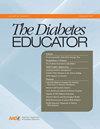Increased Awareness, Unchanged Behavior: Prediabetes Diagnosis in a Low-Income, Minority Population.
IF 3.9
Q1 Health Professions
引用次数: 2
Abstract
Purpose The purpose of the study was to explore preventive behaviors and attitudes among mostly low-income, young Hispanic women with and without prediabetes. Methods In 2017, a convenience sample of women without diabetes aged 18 to 49 years (n = 214, 77.8% Hispanic) was recruited from the waiting room of a community health center to complete a 77-item questionnaire. Attitudes, risk perception, and recent lifestyle change were measured using a validated instrument, the Risk Perceptions Survey: Developing Diabetes. Chi-squared tests and multivariable binary logistic regression were conducted to assess the relationship between prediabetes diagnosis and attitude or lifestyle variables. Results Women diagnosed with prediabetes were more likely to report worry about diabetes and to perceive themselves at higher risk for developing diabetes in the next 10 years than women without a prior prediabetes diagnosis. There was no significant association between prediabetes diagnosis and recent adoption of lifestyle changes compared with those without prediabetes. After controlling for demographic characteristics and risk factors for type 2 diabetes, prediabetes diagnosis was significantly associated with elevated risk perception for developing diabetes if no lifestyle change is made but not with worry or risk perception for developing diabetes generally. Conclusions Prediabetes diagnosis is associated with heightened perception of diabetes risk but not lifestyle change compared to women without prediabetes in this low-income, predominantly Hispanic population. Prediabetes counseling efforts must emphasize evidence-based approaches for motivating preventive behaviors.提高认识,改变行为:低收入,少数人群的前驱糖尿病诊断。
本文章由计算机程序翻译,如有差异,请以英文原文为准。
求助全文
约1分钟内获得全文
求助全文
来源期刊

Diabetes Educator
医学-内分泌学与代谢
CiteScore
4.00
自引率
0.00%
发文量
0
审稿时长
6-12 weeks
期刊介绍:
The Diabetes Educator (TDE) is the official journal of the American Association of Diabetes Educators (AADE). It is a peer-reviewed journal intended to serve as a reference source for the science and art of diabetes management.
TDE publishes original articles that relate to aspects of patient care and education, clinical practice and/or research, and the multidisciplinary profession of diabetes education as represented by nurses, dietitians, physicians, pharmacists, mental health professionals, podiatrists, and exercise physiologists.
 求助内容:
求助内容: 应助结果提醒方式:
应助结果提醒方式:


